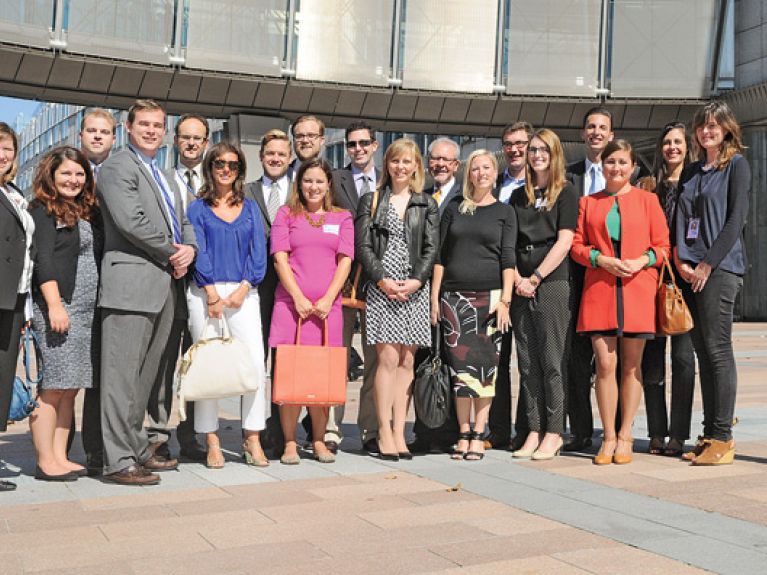Experiences from Washington, impressions from Brussels
An initiative promotes exchange between the EU and the USA, the European Parliament and Congress.

It is day three and part two of the transatlantic exchange program, this time in Brussels. Astrid Dentler’s pile of new business cards is growing and growing. At 10 a.m. the Europeans and Americans are already sitting down to their second meeting of the day. They are still thinking about the event the evening before and other appointments in the jam-packed five-day program – beginning at 8 a.m. and ending in the late evening hours. In addition, Dentler and her European colleagues have tasks to complete at their own desks. Dentler works for the European Parliament as the European People’s Party’s advisor on the Internal Market and Consumer Protection Committee.
Tired? “In a word,” admits Astrid Dentler, but the 31-year-old German and all other participants of the Congressional European Parliament Initiative (CEPI) are first and foremost happy to be taking part in the ambitious and unique program. It was two European Parliament employees who gave CEPI the decisive push five years ago. In view of the increasing importance of the Parliament in the context of the Lisbon Treaty, they considered the American perspective on European legislation highly important. But what would be the best way to reach their counterparts on the other side of the Atlantic?
CEPI was launched in 2009 with the help of the Bertelsmann Foundation. Here scholarship holders not only have the opportunity to exchange ideas and network, but they also find out how and where laws are made, discuss issues with decision-makers and representatives of all the important institutions and thus have the opportunity to gain a real impression of politics on both sides of the ocean.
“Here I can see what drives my colleagues in Brussels,” says Mike Howell. The 26-year-old American works as counsel to Senator Ron Johnson on a subcommittee of the Senate that reviews public spending. Howell has been to Europe as a tourist – but to understand the European legislative process, he says, you have to go to Brussels. “I was really impressed by all the languages being spoken around me and also the diversity of opinions,” he says. He is convinced that his new contacts will be of professional benefit to him. Colleagues who are already benefiting from contacts made through CEPI advised him to apply. In Brussels too the transatlantic exchange program has done the rounds and is enjoying increasing popularity.
The program, which receives financial support from the European Commission, has ten participants each from Europe and the United States. Scholarship holders spend a week each in Washington and Brussels, with candidates being selected by a high-profile jury consisting of former members of U.S. Congress and the European Parliament, including former President of the European Commission, Jacques Santer.
“This exchange program centers on personal encounters,” says Henning vom Stein, head of the Bertelsmann liaison office in Brussels. “We want to promote dialog.” Also important is communicating the complex legislative process: “Even we Europeans cannot always understand the politics in Brussels. What are the Americans supposed to think?”
It is not only the political processes of the respective other side that the scholarship holders internalize during their stays. The atmosphere and mutual personal perception also play a major role. “It was not clear to me the extent to which sensitivities regarding the TTIP negotiations also influence other political areas not directly linked to it, such as cyber security,” reports Mike Howell.
Ultimately, however, one insight prevails and it is one that surprises all the participants. Astrid Dentler puts it as follows: “We face the same challenges!” Both in terms of content and structure, there are many similarities. While the EU has to take into account the concerns of its 28 member states, on the U.S. side 50 states all want a say. In simplifying transatlantic dialog, Astrid Dentler and her fellow scholarship holders will in future benefit from their business cards and new personal contacts. ▪
Katharina Strobel

